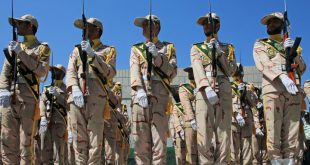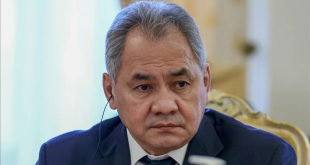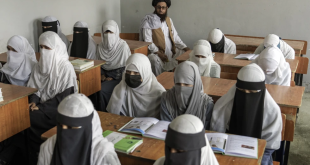By Javier Delgado Rivera
According to the U.N., COVID-19 models show that the peak for the pandemic outbreak in Afghanistan is expected between late July and early August. As the worst seems yet to come, we looked at the latest strategic situation reports on COVID-19 issued by the U.N. Office for the Coordination of Humanitarian Affairs (OCHA) in the country.
Citing data from the Afghan Ministry of Public Health, this U.N. agency indicates that, as of July 19, 35,475 people in the country have been infected with COVID-19: with 23,634 patients recovered and 1,181 deaths, 54 of them healthcare workers.
OCHA indicates that the majority of the deaths due to COVID-19 in Afghanistan (52 per cent in the case of men) have been people between the ages of 40 and 69, with men accounting for an overwhelming 71 per cent of the total COVID-19 confirmed cases.
“Due to limited public health resources and testing capacity, as well as the absence of a national death register, confirmed cases of, and deaths from, COVID-19 are likely to be under reported overall in Afghanistan,” warns this U.N. agency.
MoPH data
Again as of July 19, 83,138 people in Afghanistan, out of a population of 37.6 million, have been tested. This results in a testing rate of around 221 per 100,000 inhabitants – although it varies from provinces and districts. This is an improvement from a month ago, when the country had a rate of 157.3 tests per 100,000 people. However, Afghanistan still has one of the world’s lowest COVID-19 testing rates – the 175th out of 215 countries and territories monitored.

OCHA’s strategic situation report also alerts that hospitals and clinics in Afghanistan are struggling to maintain or expand their capacity to treat COVID-19 patients. The major obstacles in this area are a shortage of hospital material like personal protective equipment (PPE), testing kits, medical supplies, and laboratory capacity. OCHA also flags up that there is a serious shortfall in the number of trained medical staff to deal with this pandemic in the country – a fact exacerbated by the number of frontline staff falling ill.

Zooming in: food prices and returnees
OCHA pay special attention to two of the most vulnerable groups in this pandemic: farmers and Afghans coming back to the homeland.
Citing a joint survey by the Food and Agriculture Organization (FAO) and the Afghan Ministry of Agriculture, the U.N. humanitarian agency points out how over 20 per cent of the consulted farmers are not able to plant their next crop and lack access to agriculture inputs, mainly due to COVID-19 restrictions.
To make matters worse, “most wheat, fruit, vegetable and dairy processing plants are currently operating at partial/zero capacity.” As a consequence, most traders in Afghanistan have experienced increased prices for wheat, fresh food, sheep/goat, cattle, and transport as compared to the same time last year. A phenomenon likely to worsen as the pandemic reaches its peak in the country in the weeks to come.
This is one of the most worrying impacts of the COVID-19 crisis. As President Ashraf Ghani recently stated, 90 percent of Afghans are living below the poverty line — in other words, the vast majority of people in Afghanistan live on two dollars or less a day. This makes virtually all Afghans extremely susceptible to the slightest increase in food prices.
OCHA strategic situation reports in Afghanistan take a close look at one of the most fragile communities in normal times, let alone during the COVID-19 emergency: returnees. Relying on findings from the International Organization for Migration (IOM), OCHA stresses that there has been a significant increase in deportations of Afghans from Iran following the re-opening of the economy of this neighboring country.
According to the Afghan Border Monitoring Team of the Directorate of Refugees and Repatriation, between the 5th and 11th of July 10,604 Afghans returned from Iran through the Milak (Nimroz province) and Islam Qala (Herat province) border crossing sites – both voluntarily (4,283) or deported (6,321).
On Afghanistan’s eastern flank, at least 4,737 people returned on July 18 from Pakistan through the Torkham border (Nangarhar province), as the Spin Boldak (Kandahar province) and Ghulam Khan (Khost Province) crossings remain closed for pedestrians.
According to the latest border monitoring report of the U.N. High Commissioner for Refugees (UNHCR), many returnees interviewed at the Iranian and Pakistani crossings said that they faced problems during the COVID-19 outbreak in these two countries, such as lost work or wages, and lack of access to medical services.
OCHA also notes that the borders with Tajikistan, Uzbekistan and Turkmenistan remain open only for commercial traffic and crossings of passport holders back into Afghanistan.
As the U.N. humanitarian agency cautions, there is a critical need to maintain “a reliable flow of traffic for humanitarian cargo from all neighboring countries … [particularly] to expedite humanitarian food and relief items through border crossings.”
Comparisons are odious, but …
As we have seen, lack of sufficient testing capacity, a need of more medical equipment, a dangerous increase of commodity prices, and the thousands of Afghans moving back into the country from Iran and Pakistan are just some of the pressing questions posed by COVID-19 in Afghanistan.
As Deborah Lyons, the head of the U.N. Assistance Mission in Afghanistan (UNAMA), told the U.N. Security Council last month, the COVID-19 pandemic is not only a health emergency but a multi-dimensional crisis for Afghanistan.
To be truthful, it may be well the case for most countries all over the world. Yet few places on earth face the range, depth and complexity of challenges that Afghanistan confronts today.
_____
Javier Delgado Rivera is a New York-based freelance journalist writing about the United Nations. His articles have appeared in Carnegie Council, Huffington Post, South China Morning Post, Middle East Eye, Asia Times, and Jakarta Globe, among many others. You can see his work at his portfolio delgadorivera.com.
Prior to moving to New York, Javier lived in China, India and Brussels, where he worked as communications advisor for several think tanks and advocacy groups. Javier holds an MA in Conflict Resolution from the University of Coventry (UK). He also runs @TheUNTimes on Twitter, and you can reach out to him at [email protected].
 Afghanistan Times
Afghanistan Times



